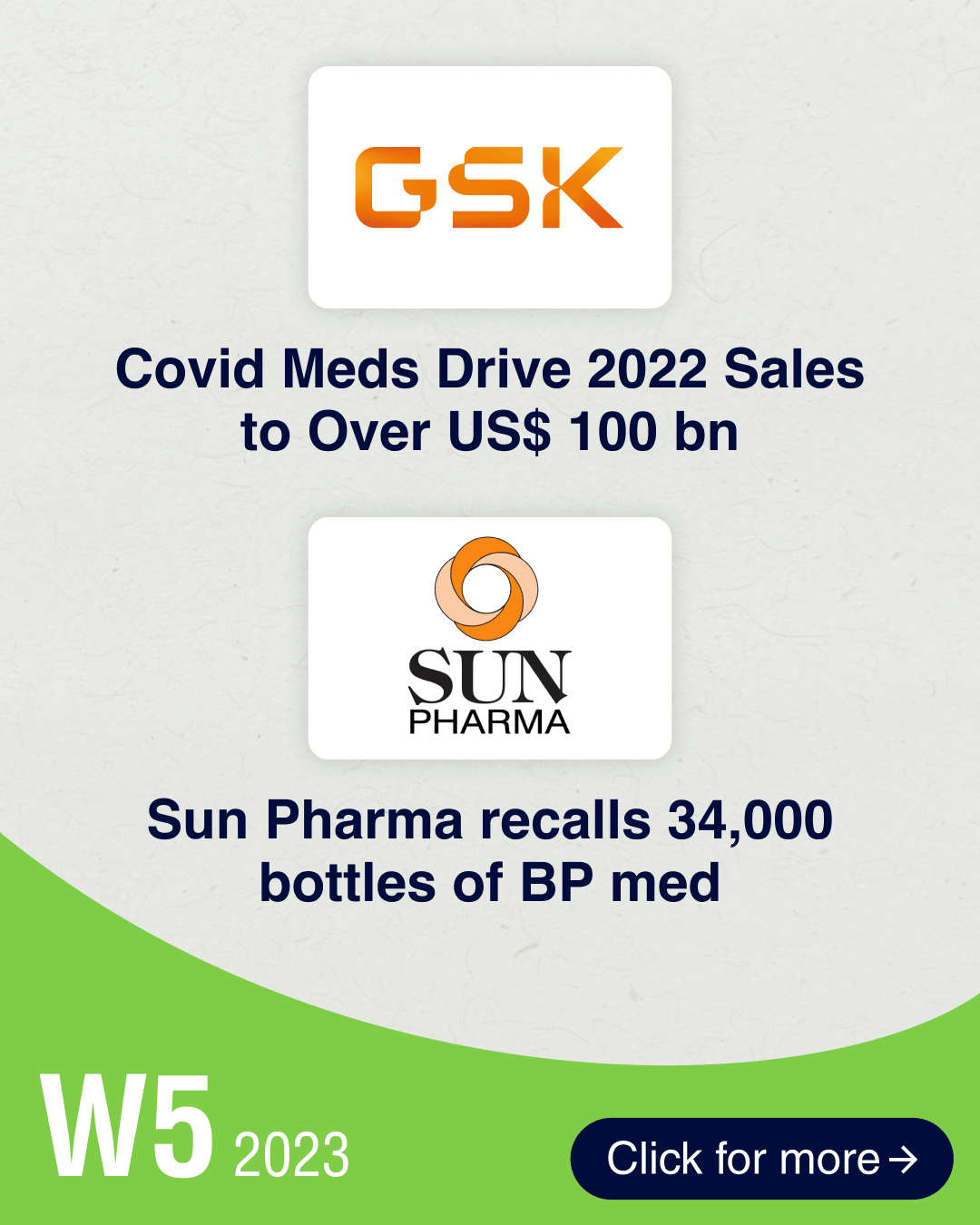
By PharmaCompass
2023-02-02
Impressions: 1,434 Article || 2 Video
Covid-19 products – Comirnaty and Paxlovid – have helped Pfizer cross US$ 100 billion in 2022 sales. With the pandemic receding, the drugmaker expects its turnover to drop 33 percent this year.
GSK’s drug — Jesduvroq — has bagged the US Food and Drug Administration’s approval as the first oral treatment for anemia caused by chronic kidney disease in adults who have been on dialysis for at least four months. The agency also granted an accelerated nod to Eli Lilly’s treatment for mantle cell lymphoma, a rare form of blood cancer. And Italy-based Menarini’s drug Orserdu has been approved by the FDA as the first oral selective estrogen receptor degrader (SERD) to treat breast cancer. Meanwhile, the agency is restructuring its food safety program in the wake of crises, such as the recent shortage of baby formula.
Sanofi is offering a voluntary retirement scheme to all 800 employees at two of its vaccine manufacturing facilities near Hyderabad in India. Amgen has retrenched around 300 employees from its commercial team in the US.
And, in a setback to Johnson & Johnson, an appeals court in Philadelphia has rejected its Texas two-step bankruptcy strategy to resolve around 40,000 lawsuits that claim its talc products cause cancer.
Covid-19 vaccine, Paxlovid push Pfizer’s 2022 sales to over US$ 100 billion
Pfizer’s total annual sales reached a record high of over US$ 100 billion for the first time in 2022, thanks to its Covid-19 products — vaccine Comirnaty and antiviral pill Paxlovid — that together brought in US$ 56 billion in sales.
Comirnaty brought in US$ 37.8 billion in sales, up only 3 percent from 2021 as demand for the vaccine slowed down. Paxlovid grossed US$ 18.9 billion in its first full year on the market.
With the pandemic receding, the company expects a significant drop in sales of its Covid-19 products in 2023. Pfizer anticipates total revenue of US$ 67 to 71 billion in 2023, a massive drop of 33 percent. The drugmaker expects vaccine sales to fall by 64 percent to US$ 13.5 billion, and Paxlovid sales to fall 58 percent to US$ 8 billion. Excluding Covid-related sales, Pfizer expects 2023 revenue to grow by 7 to 9 percent.
The New York-based pharma had launched five new products last year. It hopes to introduce as many as 14 more over the next 18 months, including a vaccine for respiratory syncytial virus (RSV) and a messenger RNA flu vaccine, to offset the loss in patent protections for some of its big-selling drugs in the near future.
GSK’s Jesduvroq bags FDA nod to treat anemia in CKD patients on dialysis
FDA has approved GSK’s Jesduvroq as the first oral treatment for anemia in adults with chronic kidney disease who have been on dialysis for at least 4 months. The drug comes with a boxed warning for increased thrombotic vascular events. The risks of hospitalization for heart failure, increased blood pressure, stomach erosions and gastrointestinal bleeding have also been highlighted.
Meanwhile, CEO Emma Walmsley said she will prioritize replenishing the company’s pipeline of vaccines and therapies. The British drugmaker exceeded fourth-quarter sales forecasts, helped by sales of its popular shingles vaccine — Shingrix. GSK generated £29.3 billion (US$ 36.3 billion) in revenue in 2022, an increase of 13 percent over 2021 figures. The company has forecast annual sales growth of at least 5 percent through 2026.
Lilly’s rare blood cancer drug, Menarini’s breast cancer med bag FDA nods
Just a week after rejecting Eli Lilly’s request for an accelerated approval of its experimental Alzheimer’s disease drug donanemab, FDA has granted an accelerated nod to the drugmaker’s treatment for mantle cell lymphoma, a rare form of blood cancer.
The drug – Jaypirca (pirtobrutinib) – was approved based on data from a mid-stage trial. The drug, which will cost US$ 21,000 for 30 days, was acquired by Lilly when it bought Loxo Oncology for US$ 8 billion in 2019.
The agency also approved Italy-based Menarini’s Orserdu (elacestrant) as the first oral selective estrogen receptor degrader (SERD) to treat breast cancer. Orserdu has been approved as a treatment for postmenopausal women or adult men with ER-positive, HER2-negative, ESR1-mutated advanced or metastatic breast cancer with disease progression after at least one line of endocrine therapy.
In other cancer drug approvals, Merck’s blockbuster treatment Keytruda received an add-on approval as an adjuvant treatment for non-small cell lung cancer (NSCLC) in the US. The agency also approved Pfizer’s Ibrance in combination with an aromatase inhibitor as a treatment for newly diagnosed HR-positive, HER2-negative metastatic breast cancer patients, regardless of menopausal status. And, AstraZeneca-Daiichi’s Enhertu has been authorized for the treatment of adults with unresectable or metastatic HER2-low breast cancer in the European Union.
Sanofi hands VRS to all 800 staff at two India plants after failing to bag contract
Sanofi plans to lay off all employees at two of its vaccine manufacturing facilities near Hyderabad in India after it failed to bag a UNICEF contract. The French drugmaker is offering a voluntary retirement scheme (VRS) to around 800 employees at its Medchal and Muppireddypally facilities that manufacture vaccines against hepatitis B, diphtheria and tetanus.
Earlier this week, Amgen laid off about 300 employees from its commercial team in the US, citing recent organizational changes to its commercial team. Pfizer has also laid off some employees at its California and Connecticut sites, but it refused to specify how many employees were impacted.
US court rejects J&J’s bankruptcy strategy to settle 40,000 talc lawsuits
Johnson & Johnson’s plan to use the Texas two-step bankruptcy strategy to resolve around 40,000 lawsuits alleging that its talc products cause cancer has been blocked by a federal appeals court. The court panel in Philadelphia voted unanimously against J&J’s attempt to transfer the lawsuits to its subsidiary, LTL Management LLC, and declare it bankrupt. Citing that J&J had agreed to fund LTL’s liabilities of up to US$ 61.5 billion, the court ruled that only companies in financial distress can file for bankruptcy. Meanwhile, J&J stood by its claim that its baby powder is safe and said it will challenge the ruling.
FDA overhauls food safety program in wake of baby formula crisis
In the wake of a series of crises, including the recent baby formula shortage, FDA has decided to overhaul its food program. The agency is setting up a new unit — Human Foods Program — devoted to food safety that will unite the FDA’s Center for Food Safety and Applied Nutrition, food policy office, and certain functions of its regulatory affairs office.The PharmaCompass Newsletter – Sign Up, Stay Ahead
Feedback, help us to improve. Click here
Image Credit : Phisper Infographic by PharmaCompass license under CC BY 2.0
“ The article is based on the information available in public and which the author believes to be true. The author is not disseminating any information, which the author believes or knows, is confidential or in conflict with the privacy of any person. The views expressed or information supplied through this article is mere opinion and observation of the author. The author does not intend to defame, insult or, cause loss or damage to anyone, in any manner, through this article.”






